12 Best Home Remedies For Dog Licking Paws
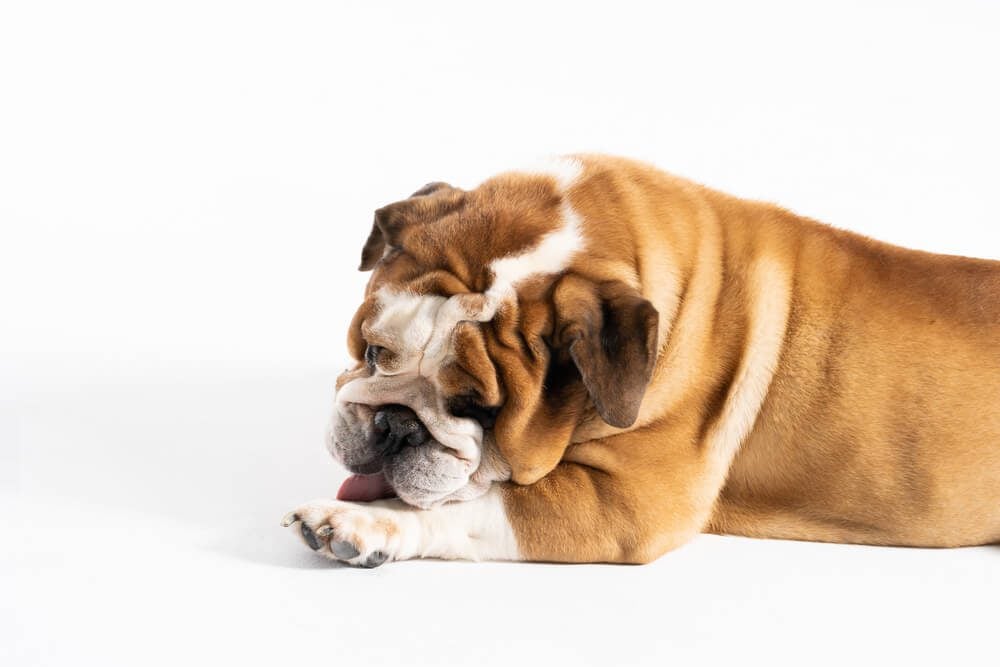
Table of Contents
While the occasional paw lick is a normal part of your dog’s grooming routine, excessive paw licking can be a cause for concern.
Both medical and behavioral paw licking is closely related to paw inflammation or canine pododermatitis – a condition often described as “complex, multifactorial, and frustrating to diagnose and treat.”
In this article, we will talk about what makes dogs obsessed with licking their paws. Then, we will discuss some home remedies for managing your dog’s itch and providing relief.
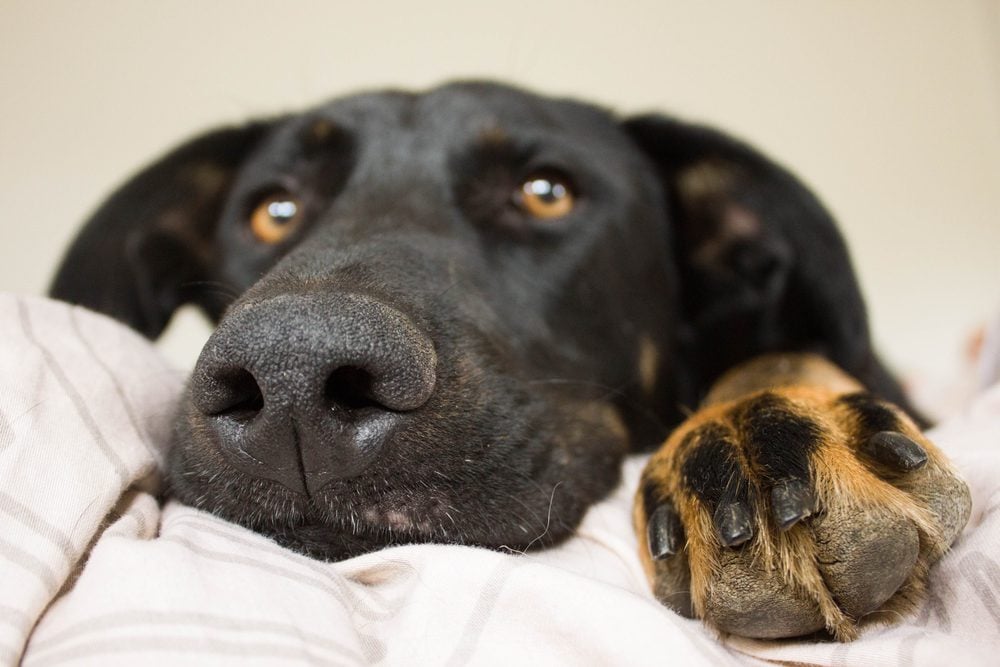
From everyday particles, the dog’s immune system misidentifies as allergens to boredom due to lack of puzzle toys and playtime, many triggers can cause your dog’s paw licking obsession. Let’s review the most widespread culprits.
Dry Skin. Dogs with sensitive skin can experience dryness due to changes in environmental conditions. When the skin on their paws dries and loses its natural elasticity, it causes itchiness and discomfort, often resulting in paw licking.
Allergies. The paws are more prone to allergic reactions in dogs with environmental allergies (pollen, molds, dust mites) and food allergies (chicken, beef, dairy, wheat). Fleas and insect bites cause allergies too. Paw licking and chewing are the telltale signs of allergies.
Parasites or Pests. If your dog is infested with pests (fleas, mites, or ticks), it could be the reason why your dog is licking their paws. Plus, flea saliva is an allergen causing flea allergy dermatitis. Because of their small size, skin parasites often go undetected.
Infections. The space between the paw pads is the perfect breeding ground for bacteria and yeasts as it is dark and warm and traps moisture. Bacterial and yeast infections lead to paw licking and symptoms like swelling, irritation, itching, and discomfort.
Injuries, Cuts, or Bruises. Your dog might be licking at its paws because of a small scrape or other injuries it sustained while walking outside. For unknown reasons, when feeling pain, dogs cope with the discomfort through excessive licking.
Behavioral Issues. Compulsive behaviors are not limited to human patients. Constant foot licking is a typical symptom of OCD-like issues in canines. Other behavioral issues causing licking of the paws are boredom and separation anxiety.
Pain. Any painful process located on the foot or paw pads (thorn nails, small wounds due to foreign bodies, blisters caused by walking on hot sidewalks, or even arthritis) can result in constant foot licking and paw biting.
Dermatitis. Skin infections are medically termed dermatitis. They can be caused by infectious agents like bacteria, fungi, and parasites (mange), food sensitivities, or inadequate grooming practices (excessive bathing, human shampoos).
Hormonal Imbalances. Endocrine conditions (hypothyroidism and hyperadrenocorticism or Cushing’s disease) alter the normal hormone levels and often trigger skin and fur problems (poor coat quality, fur loss, dandruff) as well as excessive paw licking.
Anxiety. Dogs may lick or chew on their paws when feeling stressed and anxious. This habit is an efficient coping mechanism, but continuous licking increases the risk of developing open sores and secondary infections, creating a vicious cycle of irritated paws.
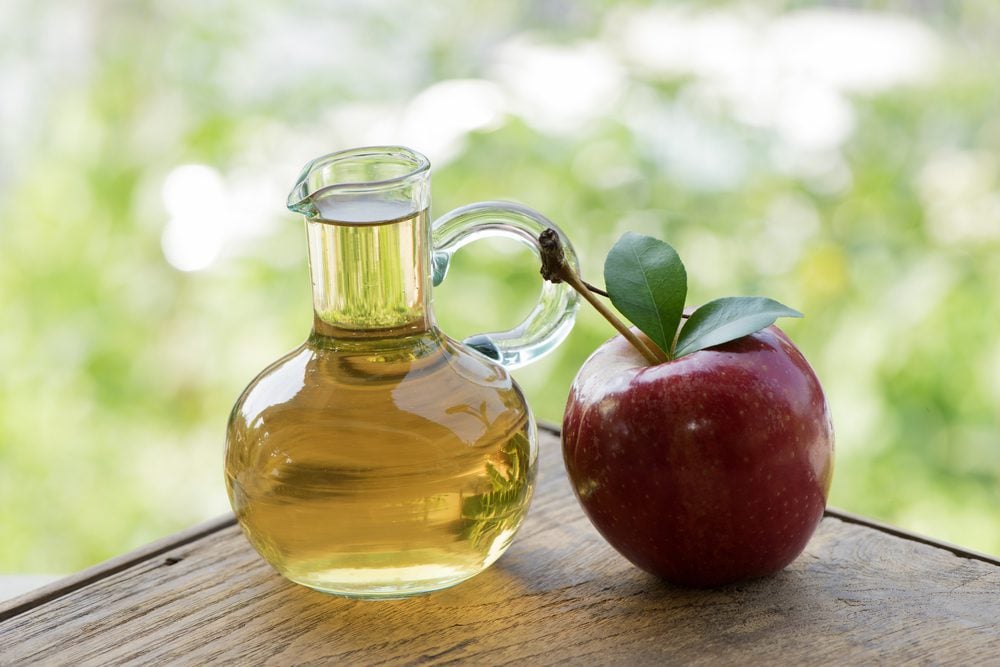
For your dog, the underlying reason for paw licking can be painful and often lead to complications. Plus, there is paw fur staining due to the constant saliva exposure.
Luckily, there are various simple, DIY home remedies for managing paw irritation and providing your pet with much-needed relief (from the paw problem and the licking obsession).
1. Soak Your Dog’s Paws in an Apple Cider Vinegar Mix
Applying apple cider vinegar on your dog’s paws is a good temporary fix until you determine the root of the problem. The taste of apple cider vinegar will deter your dog from chewing its paws and prevent secondary infections.
Since pure apple cider vinegar might be too intense for dogs, mix it up with water in a 50/50 ratio. Also, be sure to check your dog’s paws for any scrapes or cuts beforehand – you do not want to apply apple cider vinegar to open sores.
2. Use a Baking Soda Soak
Baking soda has natural anti-inflammatory properties and a unique ability to neutralize acidic irritants. Therefore, it makes an excellent remedy for dogs with dry and itchy skin, and it reduces the temptation for paw licking.
Put half a cup of baking soda into a bucket of warm water. Ideally, soak your dog’s paws for around 10 minutes and repeat the soaking two to three times per day. You can use treats to keep the dog in the soak for 10 minutes.
3. Soak Paws in Oatmeal
You probably already know that oatmeal baths are good for soothing rashes, but they can work just as well for dogs. Oatmeal is a natural moisturizer and anti-inflammatory, thus helping with dry and cracked skin.
Mix two cups of oatmeal (natural and free from flavors and sweeteners) into a bucket of warm water and let your dog’s paws soak for about 10 minutes. Your dog’s paws should look better and the licking less intense after a few soaks.
4. Apply Coconut Oil
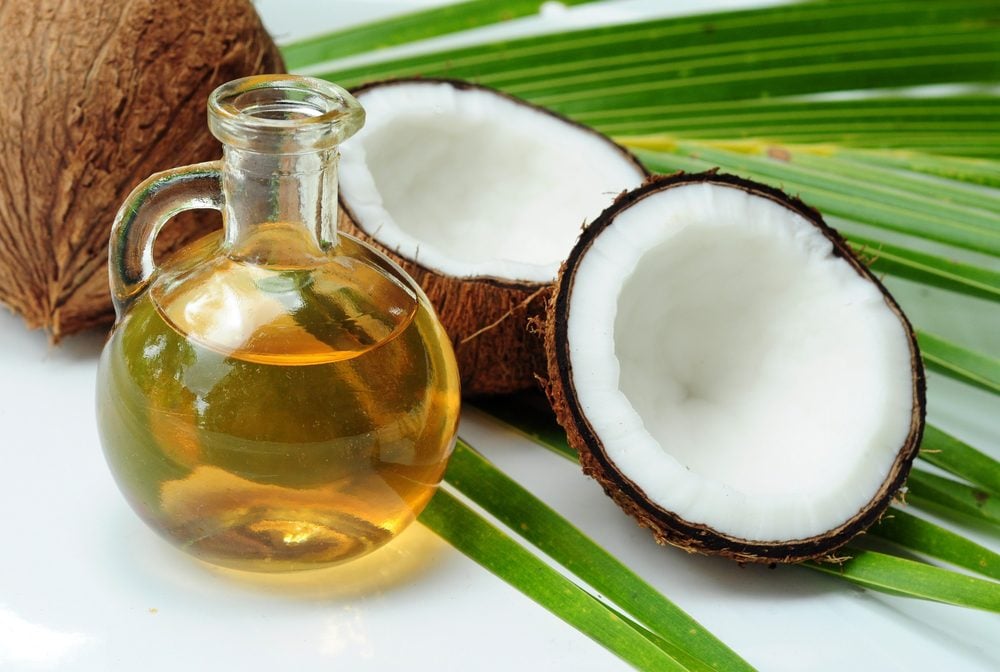
Coconut oil supports skin health and helps maintain normal moisture levels. It can also soothe skin-related irritations. Plus, it is completely safe to eat as well, so you do not have to worry about your dog licking it off.
You can opt to massage the coconut oil directly onto your dog’s paws, or you can add a little bit into its food bowl. Just make sure you are using high-quality coconut oil, preferably extra virgin and organic formulas.
5. Reassess Your Dog’s Diet
If your dog’s excessive paw licking is accompanied by frequent diarrhea bouts, food allergies are a likely culprit, and you need to reassess what your dog consumes. Common allergens in dogs are wheat, soy, eggs, dairy, beef, chicken, or fish.
To detect the food triggers, you need to switch to a simple diet (homemade or commercially available hypoallergenic formulas) to calm your dog’s immune system and then start adding new ingredients to the menu while carefully monitoring reactions.
6. Try a New Dog Shampoo
Dog shampoos are formulated to be very gentle, so it’s unlikely that they would cause any irritation. However, you may use specific dog shampoo to treat dry or irritated skin. There are many formulas that are designed exclusively for itchy skin.
Look at the ingredients before making a purchase. The ideal dog shampoo should be made of natural ingredients and moisturizing. We suggest trying the Honest Paws 5-in-1 Dog Wash. The shampoo is USA-made and groomer-recommended.
7. Try a Chamomile Bath
Chamomile is a powerful herbal remedy with antibacterial and antioxidant features. It has dual effects – in addition to providing local irritation relief, its calming properties will help manage the anxiety linked with the itchy paws.
To give your dog a chamomile bath, mix chamomile with warm water and gently soak your dog’s feet for a few minutes. Alternatively, you can use chamomile tea to rinse the paws or put chamomile tea bags directly onto the irritated paws.
8. Use Pest Medications
There are plenty of over-the-counter anti-pest medications. If you are not sure which product is best, talk to your veterinarian before the problem evolves. Ideally, you need to update your dog’s protection every month.
9. Use Dog Booties
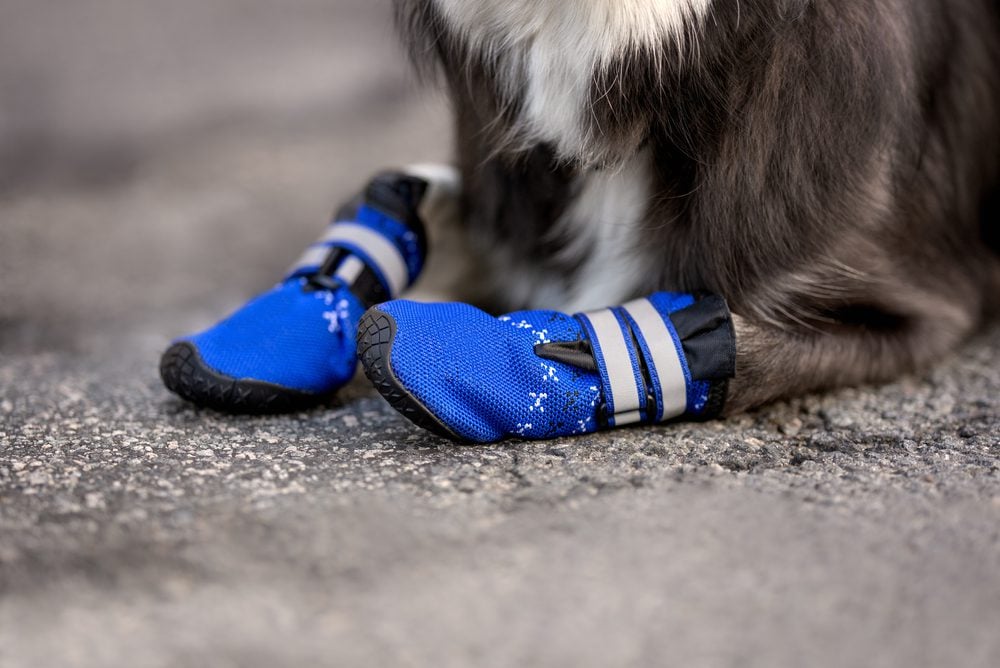
Dog booties are a good way of keeping the dog’s tongue and teeth away from the paws. Not only will the booties make it difficult for your dog to lick its paws, but they also protect them from irritants when they are outside.
A good pair of dog booties do not solve the root problem, but it is a helpful aid. Make sure they fit well and are secure. Also, it is a good idea to invest in durable booties your dog will not be able to chew through.
10. Try Applying Paw Balm
Using paw balm on your dog’s irritated paws can help skin irritations, rashes, minor cuts, and dry itchy skin. Plus it is specially made for dogs so you don’t have to worry about any toxic ingredients if ingested by your dog.
We recommend using the Honest Paws Relief Paw Balm, made of organic coconut oil, sunflower oil, sweet almond oil, jojoba oil, Vitamin E oil, and cocoa butter. Simply apply this antibiotic topical balm to your dog’s paw pads and massage it into the skin.
11. Explore OTC Medications
There are some over-the-counter medications that can help stop your dog’s paws from itching. For example, triple antibiotic ointment can be very effective for irritated paws. It manages the bacterial component and helps with dryness.
When putting any kind of topical medication on your dog’s paws, be sure to use some form of wrapping to prevent your dog from licking the medication off. Usually, licking the topical is not harmful, but it will decrease its efficacy.
12. Try Using CBD Oil
Pet CBD oil is may seem like a hype, but it is a scientifically proven aid for various conditions, including irritated paws. Namely, CBD can help on different levels – from moisturizing the skin to modifying the immune system.
We strongly recommend the Honest Paws CBD Products for dogs. They are made of organic ingredients and contain full-spectrum hemp. You can put CBD balms directly onto the itchy paws or pour CBD oil into the kibble.
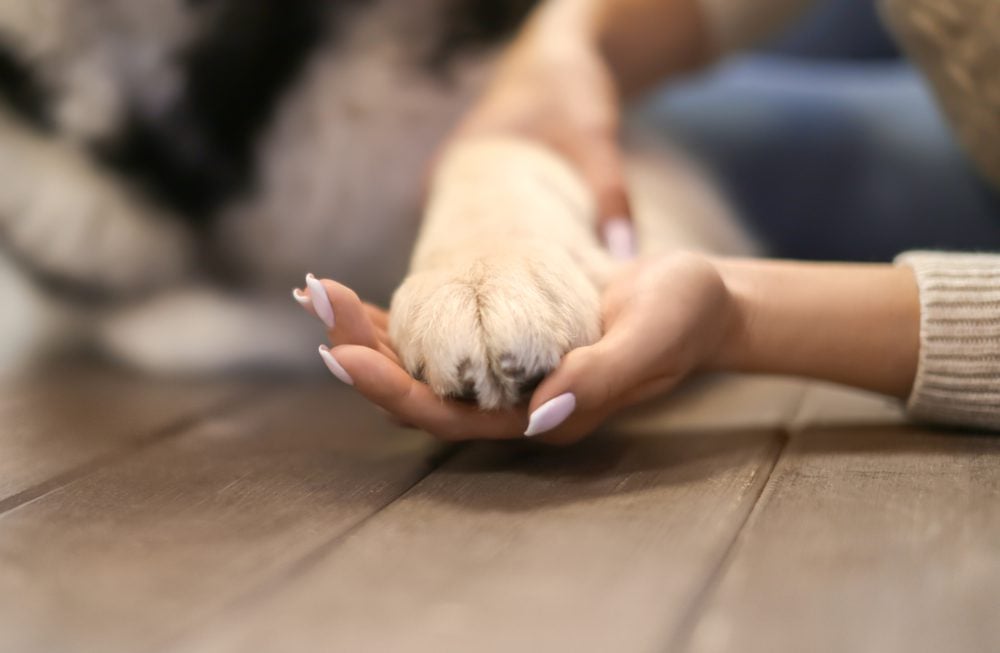
All in all, excessive paw licking in dogs is a complex issue that can stem from several health problems. Luckily, the above-mentioned home remedies can be very effective and beneficial for your dog.
However, if it does not look like the home remedies are working or you cannot determine the cause of your pet’s itchy paws, talk to your veterinarian for more advice. Also, you must call the vet if the paw licking is interfering with daily routines.




















